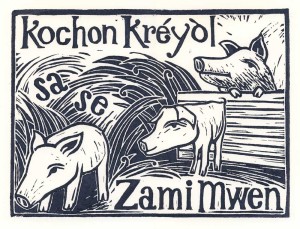We know other marketplaces.
If you enjoyed Pigs as a Paradigm, here is some more from the same place, which may be something by way of a moral. This is in Aristide’s article Globalization: A View from Below, which is a frustrating mix of sharp and important insights and politically-blinkered non sequiturs. The article includes the story about the international-aid
driven massacre of Haitian creole pigs, and also includes this, which I think is another of its best passages.
In today’s global marketplace trillions of dollars are traded each day via a vast network of computers. In this market no one talks, no one touches. Only numbers count. . . .
We know other marketplaces. On a plain high in the mountains of Haiti, one day a week thousands of people still gather. This is the marketplace of my childhood in the mountains above Port Salut. The sights and the smells and the noise and the color overwhelm you. Everyone comes. If you don’t come you will miss everything. The donkeys tied and waiting in the woods number in the thousands. Goods are displayed in every direction: onions, leeks, corn, beans, yams, cabbage, cassava, and avocados, mangoes and every tropical fruit, chickens, pigs, goats, and batteries and tennis shoes, too. People trade goods and news. This is the center; social, political, and economic life roll together. A woman teases and coaxes her client:
Cherie, the onions are sweet and waiting just for you.The client laughs and teases back until they make a deal. They share trade, and laughter, gossip, politics, and medical and child-rearing tips. A market exchange, and a human exchange.We are not against trade, we are not against free trade, but our fear is that the global market[1] intends to annihilate our markets. We will be pushed to the cities, to eat food grown on factory farms in distant countries, food whose price depends on the daily numbers game of the first market.
This is more efficient,the economists say.Your market, your way of life, is not efficient,they say. But we ask,What is left when you reduce trade to numbers, when you erase all that is human?–Jean-Bertrand Aristide, Globalization: A View from Below
In Bigelow and Peterson (eds.), Rethinking Globalization: Teaching Justice in an Unjust World (Rethinking Schools, Ltd.: 2002). 10.
Now I’d actually want to say a word or three in favor of mind-boggling scale, computer networks, and global markets. But I think what is most valuable in them — when they are valuable — is precisely their ability to interconnect and network bottom-up confederations of a lot of local, people-centered marketplaces, and to facilitate and loop in the kind of messy, informal, individually-driven, un-professional
trade that Aristide celebrates. The highly centralizing, politically captured global market
that aims to annihilate this, aims to annihilate it because it is a corporate-owned market
herded, and driven by, some very powerful interests exercising tremendous amounts of interventionist political force in order to reshape their environments, to dominate their markets, and to protect their corporate empires, their preferred business models, and their commerce without a human face. Self-organizing markets are at their best when they are the Other Marketplaces. And a radical defense of trade and private property is essential precisely because it is only by sticking to our guns, and defending market forms down to the bottom, and especially in the hands of and for the use of the poorest and most marginalized, that we can move beyond half-measures, business balance sheets and number-crunching neoliberal economic reform;
get out of the strip mall and into the bazaar; and get down into the people-powered Other Marketplaces that bring together the best of human sociality and mutual exchange.
Also.
- GT 2011-10-11: Markets used to be celebrations
- GT 2010-05-13: Bits & Pieces — The Strip Mall and the Bazaar
- GT 2010-02-04: Against legalization (cont’d)
- GT 2013-08-17: Pigs as a Paradigm
- GT 2011-10-10: Mutual Markets vs. Corporate Capitalism: A Formulation
- [1][Sic.]↩
